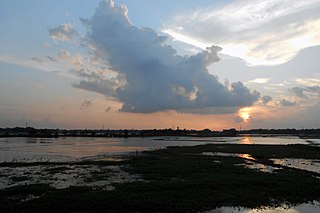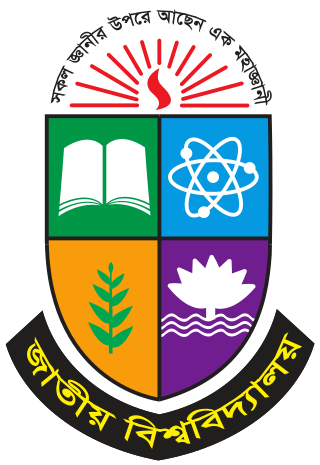Related Research Articles

Dhaka, formerly known as Dacca, is the capital and largest city of Bangladesh. It is the ninth-largest and seventh-most densely populated city in the world with a density of 23,234 people per square kilometer within a total area of approximately 300 square kilometers. Dhaka is a megacity, and has a population of 10.2 million residents as of 2024, and a population of over 23.9 million residents in Dhaka Metropolitan Area. It is widely considered to be the most densely populated built-up urban area in the world. Dhaka is the most important cultural, economic, and scientific hub of Eastern South Asia, as well as a major Muslim-majority city. Dhaka ranks third in South Asia and 39th in the world in terms of GDP. Lying on the Ganges Delta, it is bounded by the Buriganga, Turag, Dhaleshwari and Shitalakshya rivers. Dhaka is also the largest Bengali-speaking city in the world.

Muslin is a cotton fabric of plain weave. It is made in a wide range of weights from delicate sheers to coarse sheeting. It is commonly believed that it gets its name from the city of Mosul, Iraq.

Jamdani is a fine muslin textile produced for centuries in South Rupshi of Narayanganj district in Bangladesh on the bank of Shitalakhwa river.

Raipura is an upazila of Narsingdi District in the Narsingdi District belonging to Dhaka Division. It is the second largest upazila of Bangladesh.

Ishwardioffically (Ishurdi) is an upazila of Pabna District in Rajshahi Division. It is the westernmost upazila of Pabna district. This upazila is a dynamic administrative region with a rich cultural heritage and significant economic importance. Situated in the fertile Gangetic floodplain, Ishwardi Upazila boasts a landscape shaped by the Ganges and its tributaries. This region is known for its agricultural productivity, particularly in the cultivation of rice, vegetables, litchi, sugarcane and other crops. Ishwardi upazila is not only an agricultural hub but also home to various industries, including the Ruppur Nuclear Powerplant and Ishwardi Export Processing Zone, which have contributed to its economic growth. With a harmonious blend of rural and urban areas, this upazila offers a glimpse into the traditional lifestyle and modern developments that coexist within its boundaries.

National University is a public collegiate university of Bangladesh that was established in 1992 by an Act of Parliament as an affiliating university of the country to impart graduate and post-graduate level education to the students through its affiliated colleges, schools and professional institutions throughout the country. The number of colleges under the NU is 2,257. Of these, 555 are government colleges. A total of 881 colleges offer honors courses. It is the Second largest university in the world in terms of enrollment. The headquarters is in Gazipur, on the outskirts of Dhaka. After its establishment it affiliated association degree awarding colleges, where many of them were previously affiliated by the University of Dhaka, University of Rajshahi, University of Chittagong and Shahjalal University of Science and Technology.

The People's University of Bangladesh or PUB is a non-profit educational institution located at Dhaka, Bangladesh.

Bangladesh University of Textiles, commonly referred to as BUTEX, is a public university in Bangladesh, situated in Tejgaon, Dhaka. It is the only public university in Bangladesh to teach textile engineering. The institution established education which sustains the entrepreneurship and industrialisation in the RMG industry of Bangladesh.

Handloom saris are a traditional textile art of Bangladesh and India. The production of handloom saris is important for economic development in rural India.
The handloom industry in Tangail is one of the oldest cottage industries in Bangladesh. This traditional saree is produced in Tangail district and is named after the place.

Rajiuddin Ahmed Raju is an Awami League politician. He is a former posts and telecommunications minister, and labour and employment minister. He is the incumbent Jatiya Sangsad member representing the Narsingdi-5 constituency.

Farida Yasmin is a Bangladeshi journalist, and former president of the Jatiya Press Club. She was the first female president of the National Press Club. Twice elected president of the press club, she was holding that position from the year 2020 to August 2024. She is a former senior journalist of The Daily Ittefaq and former general secretary of Bangladesh National Press Club. In 2017, she was elected the first female general secretary of Bangladesh Press Club. She has also been a former joint secretary of Jatiya Press Club.

Gazipur-4 is a constituency represented in the Jatiya Sangsad of Bangladesh. Since 6 August 2024 the constituency is vacant.

Narsingdi-2 is a constituency represented in the Jatiya Sangsad of Bangladesh since 2019 by Anwarul Ashraf Khan of the Awami League.

Narsingdi-1 is a constituency represented in the Jatiya Sangsad of Bangladesh since 2008 by Muhammad Nazrul Islam of the Awami League.

Narsingdi-3 is a constituency represented in the Jatiya Sangsad of Bangladesh since 2024 by Md. Shirajul Islam Mollah of the Awami League.

The Old Dhakaites are an Indo-Aryan cultural group viewed as the original inhabitants of Dhaka. They are sometimes referred to as simply Dhakaites or Dhakaiya. Their history dates back to the Mughal period with the migration of Bengali cultivators and North Indian merchants to the city. The Bengali cultivators came to be known as Kutti and they speak Dhakaiya Kutti, a dialect of Bengali and the North Indian merchants came to be known as Khoshbas and they speak Dhakaiya Urdu, a dialect of Urdu. There are sizeable populations in other parts of Bangladesh. They have been described as a wealthy but very closed-off community; evidently being a minority in their own hometown. It is said that some people living in Greater Dhaka are even unaware of the existence of an Urdu-speaking non-Bihari minority community although their presence dates back centuries.
The Digital Security Act, 2018, was a digital security law in Bangladesh. This act was passed with the aim of preventing the spread of racism; sectarianism; extremism; terrorist propaganda; and hatred against religious or ethnic minorities through social media, print media or any other electronic media. Any content over the internet or any other media that was deemed pornographic or otherwise inappropriate by the government could be punished by fines or prison terms of various lengths.
BSCIC Jamdani Industrial Estate & Research Center is a weaving village in Narayanganj District of Bangladesh. It is popularly known as "Jamdani Palli", as it is used as an industrial estate for weaving Jamdani clothing.

Tangail saree or sari is a traditional handwoven sari of Bangladesh. It originated in the Tangail district of the country. A completely different kind of saree is produced in the Purba Bardhaman and Nadia districts of West Bengal. It is a simplified Jamdani textile which is a hybrid of Shantipuri saree with saree desighns and handloom techniques of Tangail.
References
- 1 2 "Age-old Crafts for Contemporary Markets". The Daily Star. 2 August 2013. Retrieved 11 October 2016.
- ↑ "Bangladesh Handloom Board (BHB)". Bangladesh Handloom Board. Retrieved 3 February 2024.
- ↑ "Bangladesh Handloom Board". Banglapedia. Retrieved 11 October 2016.
- ↑ "Mirpur Benaras Palli saris mostly Indian". Prothom Alo. Archived from the original on 13 October 2016. Retrieved 11 October 2016.
- ↑ "Protection of Jamdani". The Daily Star. 13 July 2014. Retrieved 11 October 2016.
- ↑ "Narsingdi weavers have no dream to weave". Dhaka Tribune. Archived from the original on 11 October 2016. Retrieved 11 October 2016.
- ↑ "Draft of BCSIR Act gets cabinet nod". Dhaka Tribune. Archived from the original on 11 October 2016. Retrieved 11 October 2016.